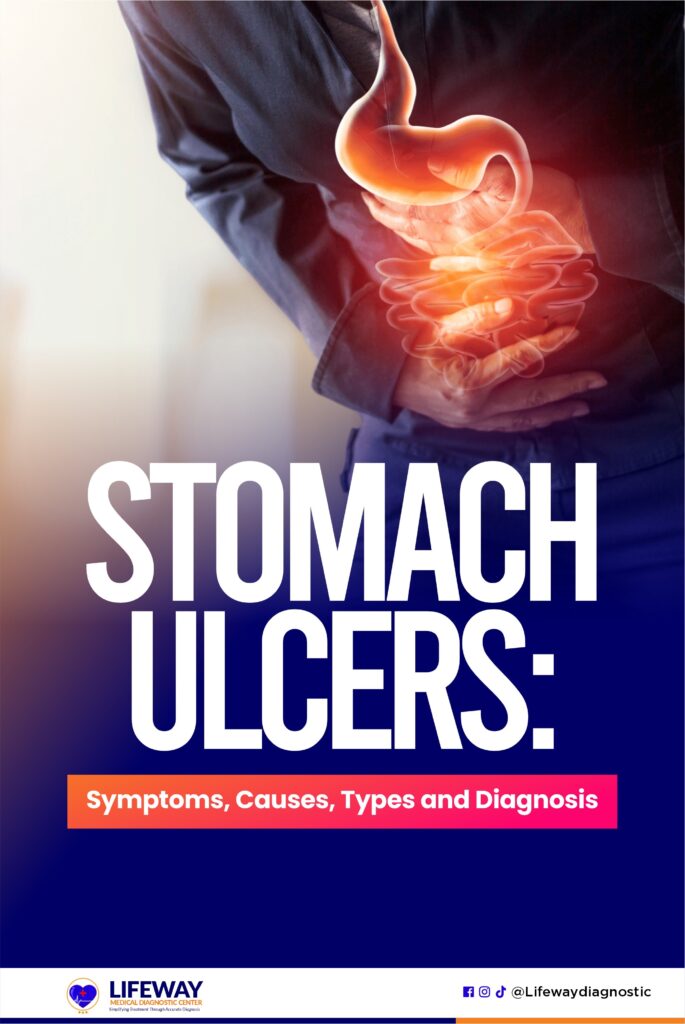Ulcers are a common medical condition that affects many individuals worldwide. These painful sores can occur in various body parts, including the stomach ulcers and the small intestine (duodenal ulcers).

In this comprehensive blog post, we will look at the various types of ulcers, including their causes, symptoms, diagnosis, and preventive measures.
By gaining a better understanding of ulcers, you can take proactive steps to manage and prevent them effectively.
Read: Echocardiography: All You Need To Know
What is a Stomach Ulcer?
A stomach ulcer, also known as a peptic ulcer, is a painful sore that develops on the stomach lining or the small intestine’s upper part.
These ulcers can be caused by factors such as bacterial infection, prolonged use of nonsteroidal anti-inflammatory drugs (NSAIDs), excessive alcohol consumption, or stress.
It’s important to seek medical attention if you suspect you have a stomach ulcer, as untreated ulcers can lead to serious complications such as internal bleeding or perforation of the stomach lining.
Treatment for stomach ulcers typically involves medications to reduce acid production in the stomach, antibiotics to treat any underlying infections and lifestyle changes such as avoiding triggers like spicy foods or alcohol.
Read Also: 11 Ways to Keep Your Heart Healthy
What Are the Common Symptoms of Stomach Ulcers?
Stomach ulcers can present with various symptoms, but some common ones to look out for include persistent abdominal pain, often described as a burning or gnawing sensation.
This pain may worsen when the stomach is empty or at night. Other symptoms can include bloating, nausea, vomiting, and feeling full quickly after eating only a small amount of food.
Sometimes, Ulcer comes with heartburn, a burning sensation in the chest, usually occurring after meals or during the night.
Additionally, loss of appetite, unintended weight loss, or a desire to eat more frequently are all symptoms of stomach ulcer.
In some cases, stomach ulcers can also lead to more serious complications such as internal bleeding or perforation of the stomach lining. It’s important to consult a healthcare provider if you experience any of these symptoms, as prompt diagnosis and treatment are crucial in managing stomach ulcers effectively.
Remember that individual experiences may vary, so it’s best to seek professional medical advice for personalized care.
Read: What Causes Shortness of Breath?
What Are the Causes of stomach ulcers?
Stomach ulcers, also known as peptic ulcers, can be caused by various factors. The most common cause is infection with the bacterium Helicobacter pylori (H. pylori), which weakens the stomach’s protective lining and allows stomach acid to damage the underlying tissues.
Other causes include long-term use of nonsteroidal anti-inflammatory drugs (NSAIDs) such as ibuprofen or aspirin. These can irritate the stomach lining and lead to ulcer formation.
Additionally, certain lifestyle factors like poor diet choices, irregular eating habits, excessive alcohol consumption, and untreated stress smoking, can contribute to the development of stomach ulcers.
It’s important to address these underlying causes to effectively manage and prevent stomach ulcers. Seeking medical advice and making necessary lifestyle changes can help in alleviating symptoms and promoting the healing of stomach ulcers.
Are there Different Types of Stomach Ulcers?
Yes, different types of stomach ulcers can affect individuals. The most common type is a peptic ulcer, which can develop in the lining of the stomach or the upper part of the small intestine.
Another type of stomach ulcer is a stress ulcer, which can occur in individuals who experience severe physical trauma, burns, or major surgery. Stress ulcers are typically related to a disruption in blood flow to the stomach lining due to extreme stress on the body.
It’s important to consult with a healthcare provider for an accurate diagnosis and appropriate treatment if you suspect you may have a stomach ulcer.
Also Read: Cucumber: Nutritional Content and Health Benefits
How Are Stomach Ulcers Diagnosed?
If you experience persistent symptoms suggestive of ulcers, it is important to seek medical attention for an accurate diagnosis. The following diagnostic methods may be employed:
Medical History and Physical Examination: Your healthcare provider will review your medical history, discuss your symptoms, and perform a physical examination.
Endoscopy: This procedure involves the use of a thin, flexible tube with a camera (endoscope) to visualize the stomach and the small intestine. Tissue samples (biopsies) may be taken for further examination.
Imaging Tests: X-rays, CT scans, or other imaging techniques may be used to identify ulcers and assess their location and severity.
Stool or Breath Tests: These tests can detect the presence of H. pylori infection, which is a common cause of ulcers.
Also Read: How To Perform CPR (Cardiopulmonary Resuscitation)
How Can I Prevent Ulcers?
While some risk factors for ulcers, such as age and family history, cannot be modified, there are several preventive measures you can take to reduce the risk of developing ulcers:
Avoid NSAIDs: If possible, limit the use of non-steroidal anti-inflammatory drugs. If you require long-term NSAID use, consult your healthcare provider about appropriate preventive measures.
Manage Stress: Employ stress management techniques, such as exercise, relaxation exercises, and mindfulness, to reduce stress levels.
Limit Alcohol Consumption: Drink alcohol in moderation or avoid it altogether, as excessive alcohol consumption can increase the risk of ulcers.
Quit Smoking: If you smoke, consider quitting. Smoking can delay ulcer healing and increase the risk of complications.
Practice Good Hygiene: Wash your hands regularly and avoid sharing utensils or personal items to reduce the risk of H. pylori infection.
Maintain a Healthy Diet: Adopt a balanced diet rich in fruits, vegetables, whole grains, and lean proteins. Avoid spicy foods and excessive caffeine intake, as they may irritate the stomach lining.
What Are the Best Treatment Remedies for Stomach Ulcers?
When it comes to treating stomach ulcers, a combination of medication and lifestyle changes is often recommended.
Proton pump inhibitors (PPIs) such as omeprazole can help reduce the amount of acid in the stomach, allowing the ulcer to heal. Antibiotics may also be prescribed if there is an infection present, as in cases of Helicobacter pylori bacteria.
One potential natural remedy for stomach ulcers is incorporating probiotics into your diet. These beneficial bacteria can help restore the balance of healthy gut flora and alleviate ulcer symptoms.
In addition to medication, making dietary adjustments can play a significant role in managing stomach ulcers. Avoiding spicy foods, alcohol, and caffeine can help reduce irritation to the stomach lining. Including more fiber-rich foods like fruits, vegetables, and whole grains can promote healing and prevent further damage.
It’s important to listen to your body and work closely with your healthcare provider to determine the best course of treatment for your situation. By combining medication with healthy lifestyle choices, you can effectively manage stomach ulcers and promote long-term digestive health.
Related: Diabetes: Types, Diagnosis, and Prevention
Frequently Asked Questions
While stress can exacerbate existing ulcer symptoms, it is not a direct cause of developing stomach ulcers.
Treatment options for stomach ulcers may include antibiotics to eradicate H. pylori, proton pump inhibitors to reduce acid production and antacids for symptom relief.
With proper treatment, most stomach ulcers can heal within a few weeks to months depending on their severity and underlying cause.
Conclusion
Stomach ulcers are a common and treatable condition that can cause significant discomfort if unmanaged. By understanding the causes and symptoms of ulcers, individuals can take proactive steps to prevent their development.
Seeking proper medical advice and treatment is crucial for managing stomach ulcers effectively. Remember to follow a healthy diet, manage stress levels, and avoid triggers that may exacerbate ulcer symptoms.
Take care of your health and consult with a healthcare professional if you experience any persistent or severe symptoms related to stomach ulcers. Your well-being is important!
Recommendation
- What are the symptoms of Kidney Disease?
- Health Benefits of Clapping Hands
- Health Benefits of Oatmeal
- Glaucoma: Types, Symptoms, Diagnosis, and Treatment
